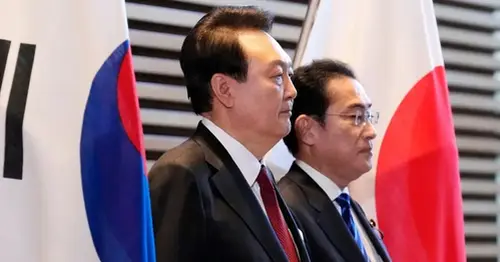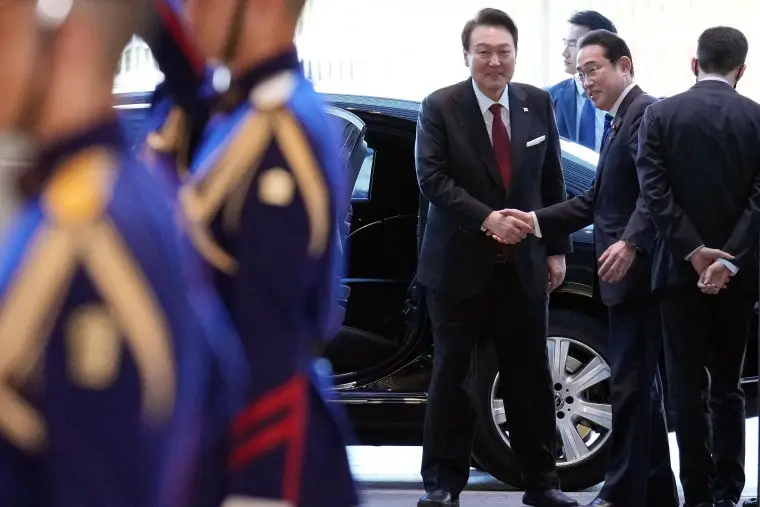
Japan and South Korea renew ties at rare Tokyo summit
TOKYO — Japan and South Korea agreed to resume regular visits between their leaders and take steps to resolve a trade dispute during a highly anticipated summit Thursday, in what Japan’s prime minister called a “big step” to rebuilding the two nations’ security and economic ties as they try to overcome a century of difficult history.
The summit could revise the strategic map of northeast Asia. The two U.S. allies, who have long often been at odds over their history, are seeking to form a united front, driven by shared concerns about a restive North Korea and a more powerful China.
Japanese Prime Minister Fumio Kishida and South Korean President Yoon Suk Yeol both stressed the importance of improved ties as they opened Thursday’s summit, hours after a North Korean missile launch and encounters between Japanese and Chinese vessels in disputed waters.
In his opening remarks, Kishida said that the meeting will mark the resumption of regular visits between the leaders, which have been on hold for more than a decade. He told a joint news conference that the countries had agreed to resume defense dialogue and vice-ministerial strategic talks, while also restarting a process of trilateral communication among Japan, South Korea and China.
Yoon said Thursday’s meeting “has special significance as it shows the people of both countries that South Korea-Japan relations are off to a new beginning after being plagued by various issues.” He added that the two countries that share the same democratic values “are partners that must cooperate on security, economic issues and global agendas.”
Yoon said “the ever-escalating threat of North Korea’s nuclear missile program poses a huge threat to peace and stability not only in East Asia but also to the (broader) international community.”
“South Korea and Japan need to work closely together and in solidarity to wisely counter the threat,” he added.
Washington appears to have worked intensively to bring about the summit. U.S. Ambassador to Japan Rahm Emanuel said his country and its two allies had about 40 trilateral meetings and he thinks cooperation in the process helped to build up trust.

Hours before the summit began, South Korean Trade Minister Lee Chang-yang said that Japan had agreed to lift export controls on South Korea following talks this week, and that South Korea will withdraw its complaint to the World Trade Organization once the curbs are removed.
Japan and South Korea have long had disputes over the 1910-1945 Japanese colonization of the Korean Peninsula and atrocities during World War II, which included forced prostitution of “comfort women” for Japanese soldiers, and territorial disputes over a cluster of islands. Ties reached a nadir when the South Korean Supreme Court ordered Japanese companies to pay compensation to Korean victims or bereaved relatives in 2018, and Japan imposed trade sanctions on South Korea shortly after.
The Japanese Economy, Trade and Industry Ministry said Japan acknowledged improvement in South Korea export controls during the talks and that as a result of Seoul’s decision to drop the WTO case, Japan decided to drop restrictions against South Korea and restore the country to the status it had before July 2019.
Lee’s ministry said the countries will continue to discuss restoring each other to preferred trade status. The two countries also agreed to begin regular dialogues on economic security, according to Kishida.
The summit comes as a series of dramatic events underscores what Kishida called a “severe security environment.”
Washington will welcome better Japan-South Korea ties, as feuding over historical issues has undermined a U.S. push to reinforce its alliances in Asia. The three countries began joint anti-submarine warfare drills Thursday, joined by Canada and India.
A North Korean missile launch early Thursday, just before Yoon departed for Tokyo, could increase momentum for him and Kishida to move their countries closer diplomatically. The intercontinental ballistic missile was launched on a steep trajectory to avoid other countries’ territory and fell into open waters off Japan’s northern island of Hokkaido. It was most likely intended to send a message both about the summit and the joint military exercises.
China’s dispute with Japan over tiny islands in the East China Sea also heated up Thursday, as both sides accused the other of violating their maritime territory. The summit follows a series of Chinese diplomatic successes in regions traditionally seen as more influenced by the U.S. Honduras announced Wednesday that it would end diplomatic recognition of Taiwan in favor of China, marking progress in Beijing’s efforts to isolate the autonomously governed island, while last week Saudi Arabia and Iran announced a surprise deal to renew diplomatic ties brokered by China.
Source: https://www.nbcnews.com/news/world/japan-south-korea-renew-ties-rare-tokyo-summit-rcna75223






